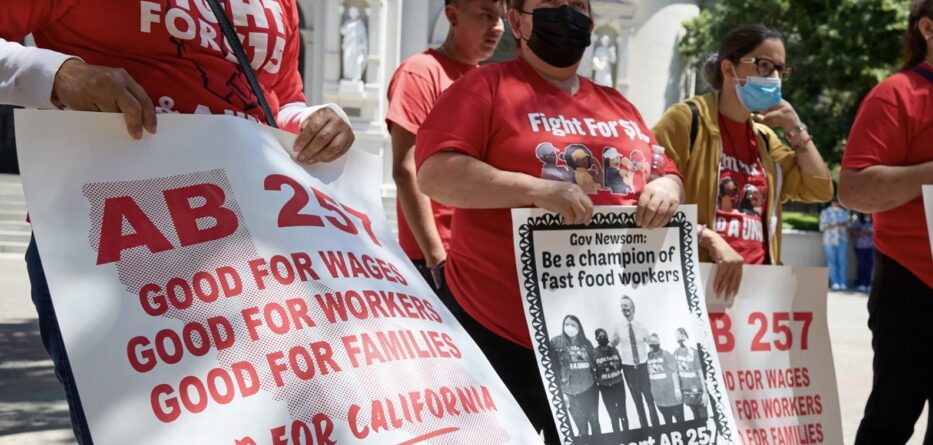On Labor Day, Gov. Gavin Newsom announced he’s signing a first-in-the-nation bill creating a council to regulate wages and working conditions in fast food restaurants.
The new law will give labor advocates a long-elusive bargaining foothold in a low-wage industry that employs more than half a million non-unionized workers statewide.
“California is committed to ensuring that the men and women who have helped build our world-class economy are able to share in the state’s prosperity,” Newsom said in a statement. “Today’s action gives hardworking fast-food workers a stronger voice and seat at the table to set fair wages and critical health and safety standards across the industry. I’m proud to sign this legislation on Labor Day when we pay tribute to the workers who keep our state running as we build a stronger, more inclusive economy for all Californians.”
Pushed by the Service Employees International Union and fiercely opposed by business groups, the FAST Recovery Act barely passed the state Senate with the minimum number of votes. The vote was just as narrow in the Assembly hours later. Several Democrats abstained; after it passed six switched their votes to support it.
The new statewide council would be able to set standards across the fast food industry on wages and workplace conditions such as safety measures and even the temperature of a restaurant. Labor advocates say the bill would give workers bargaining power in an industry where union representation is difficult to achieve because of high staff turnover and franchise ownership.
Lawmakers pared back the bill significantly to push it toward final passage after several moderate Democratic legislators balked at earlier proposals to give the new council sweeping regulatory authority over the industry. Lawmakers added a bevy of amendments last week to address the concerns of business owners.
In one major concession, lawmakers stripped out a provision that would have held fast food corporations jointly responsible for wage and labor violations at franchise locations. The bill’s sponsor, Democratic Assemblymember Chris Holden of Pasadena, said that was a “significant piece” in swaying some colleagues.
California in recent years has been extending this kind of labor law liability in other industries — from janitorial and gardening contractors to the building owners and firms that hire them, for example — as part of its efforts to combat wage theft. But fast food franchise corporations have long avoided that responsibility in federal and state labor law.
Bottom of Form
Even without that provision, labor leaders were calling the bill a victory. SEIU president Mary Kay Henry said at a rally outside the Capitol that the bill was a “watershed moment for working people.”
Of particular significance: including workers on the council alongside industry representatives, said Columbia University labor law expert Kate Andrias.
“Upending our state’s existing lawmaking structure and regulatory platform is no way to help workers.”
JOT CONDIE, CALIFORNIA RESTAURANT ASSOCIATION PRESIDENT
The United States and California have used boards for other industries before to set minimum wages, particularly during the first half of the 20th century. But, Andrias said, the fast food bill is “a more expansive and ambitious variation” of those past efforts by having workers sit directly on the council and covering a wider range of working conditions.
The fast food industry, however, is trying to qualify a referendum for the 2024 ballot to overturn the law. State officials cleared the referendum for signature gathering Friday Sept. 16. Supporters need 623,000 signatures by Dec. 5 to get the question before voters.
Business and restaurant groups, which spent big on TV advertising opposing the bill, have said fast food is being unfairly targeted and warned the new regulations would force restaurants to increase prices at a time of record inflation.
The broadcast and digital ads called the bill a “food tax.”
“Upending our state’s existing lawmaking structure and regulatory platform is no way to help workers,” said Jot Condie, California Restaurant Association president, in a statement.
Key compromises
Newsom signed the bill, even though his Department of Finance opposed it, saying it would create ongoing costs and worsen delays in the state’s labor enforcement system.
Supporters said the bill incorporates their discussions with the Newsom administration.
Aside from the removal of labor liability for fast food chains, the bill’s other changes include provisions preventing the council from requiring any new paid leave benefits for workers, or from regulating how fast food restaurant operators schedule workers’ hours. Also any minimum wage the council sets would be capped at $22 an hour in 2023 and subject to inflationary increases in future years. The bill also includes a six-year expiration date.
Some food businesses would be exempt from the council’s rules, including bakeries, grocery store fast food counters, and chains with fewer than 100 locations nationally —that’s up from a prior threshold of 30 locations or less.
Balancing act
It was not immediately clear how many businesses or workers would be excluded by raising that threshold. For franchised brands with locations in California, the number of chains fitting the description fell from 149 to 84, according to the International Franchise Association.
The bill would give workers and their advocates an equal number of seats on the council as business representatives. The rest of the council would include two representatives of the governor’s administration – from the Labor & Workforce Development Agency and the Office of Business and Economic Development.
Sen. Dave Min, an Irvine Democrat, said he initially “had some deep concerns” about the legislation but supported the more limited version.
“I feel it’s our duty to protect our business centers from overburdensome state regulations, but we also have to balance that against the rights of the workers that serve us,” he said.





